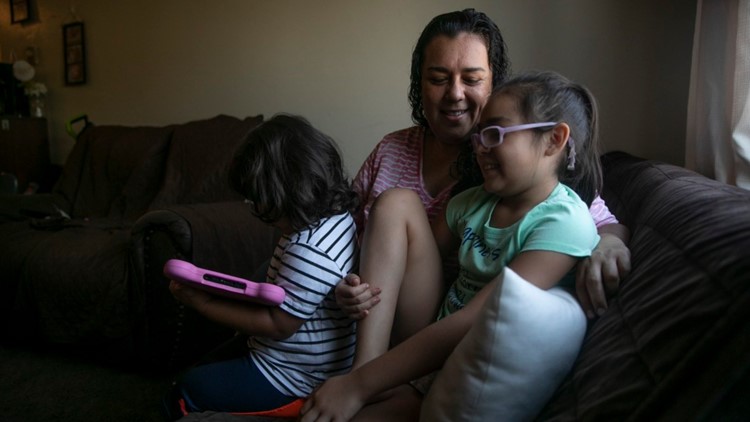CALIFORNIA, USA — Out of work for months in the spring, Mariana, who cleans houses, and her husband Gerardo, who is a door-to-door salesman, paid their landlord just $300 of their $1,200 rent for a one-bedroom apartment they crowd into with their 2-year-old son and 8-year-old daughter, in National City.
Mariana was a social worker in Mexico before her family came to the U.S. If she had citizenship, that’s the kind of job she’d like to do here, or maybe she’d run a daycare or a senior home. She could work from home, she wouldn’t have lost her job, and even if she had, she’d apply for unemployment — “yo hubiera podido trabajar de casa, no hubiera perdido mi trabajo, o aplicar para un desempleo,” she said.
“Esta podría ser la diferencia,” Mariana said: That could be the difference.
Without a safety net to catch them, California’s undocumented residents have been thrust in deep poverty, facing long stretches of unemployment, new child care demands, unexpected expenses, and, often, the need to risk their health to continue putting food on the table. CalMatters agreed to use only first names because Mariana, her husband and her daughter are undocumented.
Even in a state that has tried to break economic barriers for those without legal status by granting driver’s licenses and expanding health care for children, California lawmakers struggle over how much help to provide to its most marginalized residents. In the final days of the legislative session, lawmakers approved two bills to provide modest financial assistance to undocumented Californians: one would provide immediate relief with a $600 grocery money assistance and the other would let undocumented tax-filers receive the state’s tax credit for low-income workers starting next spring.
This patched-together safety net won’t match the depth of need facing California’s estimated 2 to 3.1 million undocumented immigrants, and the one in eight school-age children who have an undocumented parent, advocates say. But it will help.
“Ya con eso pagaríamos la deuda,” Mariana said: With that, we’d pay off our debt — the $2,000 they now owe their landlord.
Now it’s up to Gov. Gavin Newsom to decide whether to sign them into law. Newsom has deferred on including all undocumented workers in the tax credit in the past, including in a major expansion, citing financial concerns, which conservative lawmakers echoed in hearings last week.
“We have to be real careful about how we’re spending state dollars,” said Sen. John Moorlach, a Costa Mesa Republican, who voted against the bill.
Two waves of COVID, financial impacts
Most undocumented Californians work in jobs that can’t be done from home.
About one-third work in industries that COVID-19 immediately ground to a halt, such as food service, retail, child care, janitorial services, or landscaping, according to an analysis by the California Budget and Policy Center.
In March, the restaurant workers lost their jobs, said Arcenio Lopez, executive director of the Mixteco/Indígena Community Organizing Project, which works with mostly undocumented and indigenous immigrants from the south of Mexico who live in Ventura and Santa Barbara counties. Homeowners told domestic workers and landscapers to stop coming to work, Lopez said. Many lost income for three months, while spending extra money to stock up on groceries, soap and masks.
Then, as those jobs began to reappear at the start of summer, a second wave hit the farmworkers. COVID-19 cases soared. Many lost weeks of work because they fell ill, were ordered to quarantine at home, or were laid off when a farm had to shut down. Often, they weren’t paid the legally required 10 days of sick leave, Lopez said. Those who had fallen ill sometimes struggled to find new jobs.
Lopez’ organization co-sponsored the 805 UndocuFund, which has raised almost $5 million in donations to support 7,000 undocumented families in the region. But the lack of a safety net has caused many to return to work even when it was unsafe, said Lopez: “There’s no other way, they can’t file for unemployment.”
Ironically, that inequality has kept some sectors of California’s economy humming.
“That’s certainly how agriculture, meat packing and garment (industries) have been able to keep moving,” said Manuel Pastor, a University of Southern California sociologist who directs the Equity Research Institute and advises Newsom’s recovery task force.



